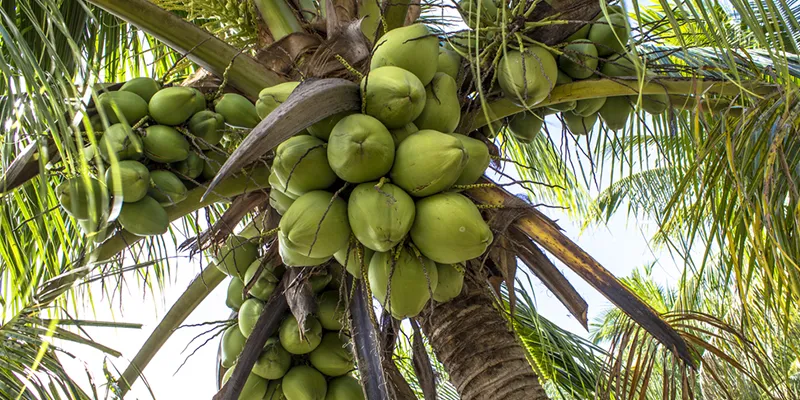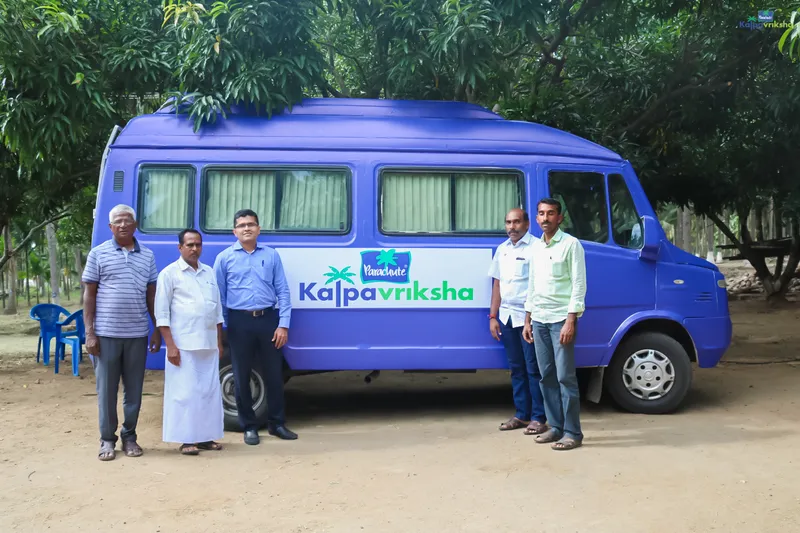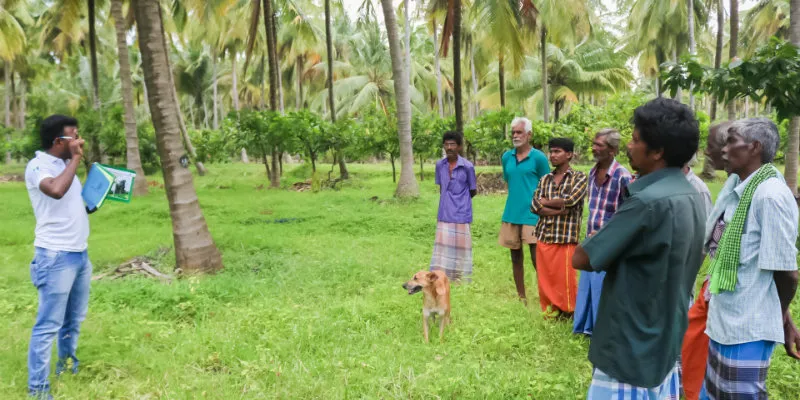With Kalpavriksha, Marico is bringing tech, innovation, and efficiency to coconut farmers
The Kalpavriksha initiative helps coconut farmers increase their yield by training them in all aspects of farm management, including nutrient, pest management, disease, and water management.

The coconut tree is often called the kalpavriksha, or the tree of life, as every part of it yields benefits to the user.
Raised in Kerala, coconut trees were not an uncommon sight for me, with every house having at least a few. I was not completely unaware of the nuances of coconut farming but, for the first time, I got an opportunity to understand in depth the challenges faced by coconut farmers.
On an invitation from Marico Ltd, I joined a group of journalists on a farm visit to Pollachi, a two-and-a-half hour drive from Coimbatore. As we entered the outskirts of the town, I saw a swathe of green on either side, the region being dotted by hundreds of coconut palms.

Marico Ltd, with its Kalpavriksha programme currently operational in Tamil Nadu and Kerala, aims to help coconut farmers achieve better productivity and yield with new-age techniques and technology. In an interactive session, it brought together farmers from neighbouring villages and towns to speak about their challenges and how technology has helped them.
“The Kalpavriksha programme started a year ago, essentially highlighting Marico’s purpose – to make a difference in the lives of all our stakeholders. Coconut farmers form an important element of our business. It began by shifting our factory from Sewri (in Mumbai) to three states of the South, where coconuts are grown. Then it became imperative to think of improving the lives of coconut farmers in these states,” says Udayraj Prabhu, Executive VP and Head - Procurement, Marico.
He goes on to explain steps taken by Marico to understand the task at hand. “We visited various universities, understood their recommendations, and undertook trials in various farms to find out whether they worked on not,” he adds.
The programme began by employing six agronomists who worked with 125 farmers on various aspects like irrigation, the seedling, and water conservation. In a year, the agronomists saw an increased productivity of 20 percent. This gave Kalpavriksha the confidence to extend its programme beyond a few farms and a few farmers.
Small steps go a long way

The Kalpavriksha programme is mostly information-based and concentrates on key areas like the right fertilisers and nutrients that should be used, and how best to use water that is available.
“In Tamil Nadu, there are various challenges with regard to availability of water. While drip irrigation is recommended, ferti-irrigation works well to conserve water. Also, most farmers still depend on the traditional variety of coconuts than a hybrid one, as the latter costs more, but definitely gives a better yield,” Udayraj explains.
Currently, Kalpavriksha has around 3,500 farmers from around 100 villages enrolled in its programme. It is said to have reached out to over 1.3 lakh farmers through digital channels. The initial phase has seen an 18 percent increase in productivity, with the initiative hoping to connect to 14,000-15,000 in the current fiscal.
Using tech to ease farmers’ woes
How can information reach the farmer in a seamless manner? How can he connect to Marico representatives and their agronomists? “We have a dedicated Kalpavriksha IVR (Interactive Voice Response Line) toll-free line where experts answer any questions the farmers would have. The second resource is an app (called Kalpavriksha) that a farmer can download for information. Registration is easy, all it needs is a name, address of the farm and a telephone number,” Udayraj says.
Meetings are a big part of inducting farmers into the programme. We visit a nearby farm where such a meeting is in progress. With the help of visual aids, the farmers are being taught about pest control practices and nutrient management techniques.
“We are only looking at providing information right now, which is available to every farmer free of cost. We believe for any kind of farming to be self-sustaining and commercially lucrative, right knowledge should be imparted,” Udayraj adds.
It is this knowledge that has helped a mechanical engineer turned farmer, Santhanam, who owns a five-acre coconut farm in Coimbatore. “I was raised in an agricultural family and took over from my father. Initially, I faced a lot of challenges. I met Marico representatives at an exhibition and got in touch with them regarding various aspects of coconut cultivation. My yield has increased by employing the methods suggested by them,” he says.
Kalpavriksha will soon work on the lines of a foundation, where other services will also be provided. It also aims open a university that will impart training to coconut farmers and conduct research in the field.







